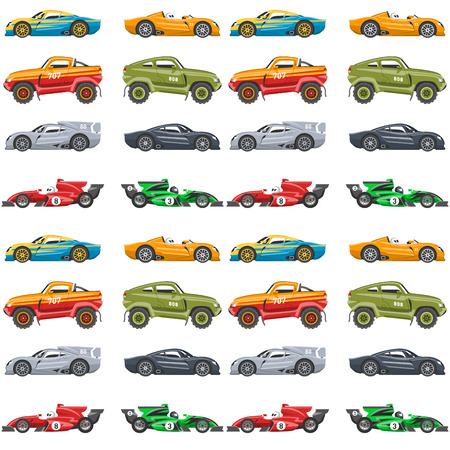The Backbone of British Motorsport: An Introduction to BTCC
If you talk about motorsport in the UK, it’s impossible not to mention the British Touring Car Championship—affectionately known as the BTCC. Since its inception in 1958, the BTCC has carved out a legendary status as one of Britain’s most fiercely contested and beloved racing series. Unlike single-seater championships, BTCC brings road-going saloons to life on some of the country’s most iconic circuits, blending high-octane action with a relatable, everyday appeal that has captured the hearts of fans up and down the nation.
More than just a racing series, BTCC is a true British institution. It’s where household car brands like Ford, Vauxhall, BMW, and Honda have battled it out through rain or shine, bringing drama and excitement to weekend afternoons. The championship’s unique format—with close-contact racing, reverse grids, and weight penalties—ensures edge-of-your-seat unpredictability at every turn. It’s this accessibility and raw competition that have made BTCC a stepping stone for legendary drivers and a mainstay on TV screens across the country.
BTCC at a Glance
| Year Founded | Key Circuits | Iconic Manufacturers | Typical Race Format |
|---|---|---|---|
| 1958 | Brands Hatch, Silverstone, Donington Park, Oulton Park | Ford, Vauxhall, BMW, Honda, Toyota | Multiple sprint races per event with grid reversals & success ballast |
The BTCC isn’t just about fast cars—it’s about personalities who’ve become legends both on and off track. These drivers have helped shape not only the championship but also British motorsport culture itself. In the following sections, we’ll dive into the profiles of these influential racers whose skill and character have turned them into icons of UK racing history.
2. Classics on the Grid: Early Icons and Trailblazers
The British Touring Car Championship (BTCC) owes much of its early identity to a handful of pioneering drivers whose talent, determination, and charisma set the tone for generations to come. These classic racers didn’t just win trophies; they became household names across Britain, lighting up circuits from Brands Hatch to Silverstone and inspiring future stars with their fearless approach and larger-than-life personalities.
The Founding Legends
When the BTCC launched in 1958 (then known as the British Saloon Car Championship), it quickly attracted a colourful cast of characters. Their rivalry and sportsmanship were instrumental in shaping both the competition’s spirit and its enduring popularity among UK motorsport fans.
| Driver | Active Years | Signature Car | Notable Achievements |
|---|---|---|---|
| Jack Sears | 1958-1963 | Austin Westminster, Ford Cortina | First-ever BTCC Champion (1958) |
| Jim Clark | 1960-1967 | Lotus Cortina | F1 World Champion, BTCC race winner |
| Gerry Marshall | 1963-1987 | Vauxhall Firenza, Opel Commodore | Over 600 career wins, crowd favourite |
| Frank Gardner | 1968-1973 | Ford Escort, Chevrolet Camaro | Three-time BTCC Champion (1967, 1968, 1973) |
Their Lasting Impact on British Motorsport Culture
These early icons were more than just fast drivers – they embodied grit, ingenuity, and that uniquely British knack for making racing both serious sport and good fun. Jack Sears’ gentlemanly conduct set a standard for fair play, while Jim Clark’s versatility made him a legend not just in touring cars but across the motorsport world. Gerry Marshall’s showmanship and relentless pace earned him cult hero status at circuits up and down the country. Meanwhile, Frank Gardner brought an international flair and technical prowess that elevated the level of competition.
Cementing the BTCC’s Place in British Hearts
The exploits of these pioneers helped turn the BTCC into a staple of weekend telly and family outings—British fans flocked to racetracks or gathered around the telly to watch their favourites battle it out wheel-to-wheel. Their legacy is still felt today: the championship remains one of Britain’s most beloved racing series, thanks in no small part to these early trailblazers who made the grid legendary.

3. Modern Masters: The Faces of Contemporary BTCC
As British Touring Car Championship (BTCC) entered the 1990s and beyond, a new generation of drivers brought fresh energy and flair to the grid. These modern masters not only racked up wins but also became household names, thanks to their skill, charisma, and relentless pursuit of victory. Let’s take a closer look at some of these influential figures who have shaped the contemporary era of British touring cars.
Icons of the Modern Era
The post-90s BTCC saw fierce competition, with manufacturers like Vauxhall, Honda, and BMW investing heavily in talent. This period gave rise to drivers who combined technical know-how with show-stopping performances on classic UK circuits.
| Driver | Debut Year | Championships Won | Notable Teams |
|---|---|---|---|
| Jason Plato | 1997 | 2 (2001, 2010) | Renault, SEAT, Chevrolet, MG |
| Matt Neal | 1991 | 3 (2005, 2006, 2011) | Team Dynamics/Honda |
| Gordon Shedden | 2006 | 3 (2012, 2015, 2016) | Honda Yuasa Racing |
| Colin Turkington | 2002 | 4 (2009, 2014, 2018, 2019) | West Surrey Racing/BMW |
Their Impact on British Motorsport Culture
This era’s drivers didn’t just win races—they changed the face of British touring cars. Jason Plato’s outspoken personality made him a fan favourite on and off the track. Matt Neal broke new ground as an independent driver by winning overall against manufacturer-backed rivals. Gordon Shedden’s consistency and Colin Turkington’s ice-cool racecraft have both inspired a generation of up-and-coming racers.
A New Level of Professionalism
The professionalism these modern masters brought to BTCC set new standards—dedicated fitness regimes, data-driven setups, and slick team operations all became the norm. Their influence extends beyond trophies; they’ve helped elevate the championship into one of Britain’s most exciting sporting spectacles.
4. Defining Moments: Unforgettable Races and Rivalries
British Touring Car Championship history is packed with edge-of-the-seat moments, where drivers became household names through legendary duels and season-defining victories. The BTCC has always thrived on fierce competition, and the drama on track often spills over into the paddock, creating rivalries that are spoken about for years. Here’s a look at some of the most iconic clashes and comebacks that have truly defined Britains touring car legends.
Famous Duels That Shaped BTCC History
| Year | Drivers Involved | Race/Rivalry | Key Highlights |
|---|---|---|---|
| 1992 | Tim Harvey vs. John Cleland vs. Will Hoy | Silverstone Finale | A nail-biting title decider, ending with Harvey snatching the championship in a rain-soaked thriller. |
| 2000 | Alain Menu vs. Jason Plato | Snetterton Showdown | A clash between teammates as Renault dominated; Menus aggressive style contrasted with Plato’s consistency. |
| 2011 | Matt Neal vs. Jason Plato | Season-long Rivalry | The two clashed repeatedly on and off the circuit, igniting one of BTCC’s most heated modern rivalries. |
| 2019 | Colin Turkington vs. Dan Cammish vs. Andrew Jordan | Brands Hatch Finale | A dramatic championship decider with heartbreak and elation on the final laps. |
Dramatic Comebacks & Season-Defining Victories
The BTCC is never short of stories where drivers bounce back from adversity to claim glory. Take for instance Rob Huff’s 2003 campaign, where he overcame multiple DNFs to end the season with an astonishing run of podiums, or Andy Rouse’s dominance during the mid-1980s after early setbacks each year. These comebacks aren’t just about technical prowess; they’re testaments to British grit and determination behind the wheel.
Unforgettable Moments in BTCC Lore
- Murray Walker’s Classic Commentary: Who can forget Murray Walker’s excitable tones narrating Frank Biela’s last-corner pass at Donington in 1996? A true British motorsport moment.
- The 1998 Three-Way Title Fight: Anthony Reid, Rickard Rydell, and Menu battled down to the wire – a season that had fans glued to every round.
- Jason Plato’s 2010 Comeback: After several seasons of near-misses, Plato returned to form with a storming drive at Silverstone, sealing his legendary status once more.
The Lasting Impact of These Moments
These defining races do more than fill highlight reels; they cement reputations and set new standards for what it means to be a BTCC legend. Whether it’s a bumper-to-bumper duel or a comeback drive through the pack, these moments are woven into the very fabric of British motorsport culture—fuel for pub debates and inspiration for future generations of drivers.
5. Road to Success: The British Way to Touring Car Stardom
Becoming a legendary BTCC driver is not just about raw talent—its also about embracing the unique British journey from grassroots motorsport to professional stardom. The path is distinctly shaped by local racing culture, strong community support, and the values that define British motorsport. Let’s take a closer look at the elements that make up this very British route to success:
The Grassroots Foundation
Most BTCC legends started out on humble circuits, often racing in club-level championships or karting series scattered across the UK. This grassroots scene is the lifeblood of British racing, offering aspiring drivers a chance to hone their skills and catch the eye of bigger teams.
| Stage | Description | Notable Circuits |
|---|---|---|
| Karting | The entry point for most young racers; builds racecraft and confidence. | Buckmore Park, Lydd Kart Circuit |
| Club Racing | Moving up to saloon car or single-make series; vital for networking and exposure. | Brands Hatch Indy, Silverstone National |
| National Championships | Stepping into more competitive series such as the Renault Clio Cup or Ginetta Juniors. | Croft Circuit, Donington Park |
| BTCC Opportunity | Getting noticed by BTCC teams via consistent performance and public support. | All major UK circuits |
The Role of Team Culture
The British touring car scene prides itself on tight-knit teams where everyone chips in—from mechanics to strategists. Its common for drivers to build lifelong relationships within these squads, learning the importance of teamwork and mutual respect. Many successful BTCC racers credit their rise to being part of a supportive, passionate team environment where no job is too small and every detail matters.
Pillars of British Team Culture:
- Loyalty: Many drivers stick with the same outfit for years, fostering trust and understanding.
- Innovation: British engineering prowess means constant tweaking for that extra edge.
- Camaraderie: The paddock has a family feel—rivalries are fierce but friendships often run deeper.
The Power of Public Support
No other touring car championship enjoys quite the same level of passionate fan engagement as the BTCC. From autograph sessions at Knockhill to packed grandstands at Oulton Park, fans play a huge role in motivating drivers and shaping their careers. Local sponsors are also crucial, providing financial backing that can make all the difference for an up-and-coming racer.
How Fans Make a Difference:
- Lively social media communities keep the buzz going year-round.
- Grassroots fundraising campaigns have helped launch future stars’ careers.
- The sense of connection between drivers and fans is uniquely British—often extending far beyond race weekends.
This combination of grassroots beginnings, strong team culture, and unwavering public support forms the backbone of Britain’s touring car legacy. It’s what sets apart BTCC greats and ensures the championship remains one of motorsport’s most accessible—and fiercely competitive—arenas.
6. Behind the Wheel: Life, Character, and Legacy Off the Track
For many British Touring Car Championship (BTCC) fans, legendary drivers are more than just fast racers—they’re role models, local heroes, and enduring symbols of British motorsport spirit. Beyond their on-track exploits, these drivers have shaped the sport’s culture, inspired new talent, and left a lasting legacy that continues to influence generations. Their dedication and character resonate both in paddocks and in the everyday lives of enthusiasts across the UK.
What BTCC Legends Mean to Fans
The connection between BTCC drivers and fans runs deep. Whether it’s the gritty determination of Colin Turkington or the charismatic presence of Jason Plato, supporters see themselves reflected in these racers’ triumphs and setbacks. Race weekends at iconic circuits like Brands Hatch or Silverstone are as much about meeting heroes and sharing stories as they are about the racing itself.
| Driver | Fan Qualities | Community Engagement |
|---|---|---|
| Jason Plato | Accessible, Outspoken | Regular fan meet-and-greets |
| Colin Turkington | Resilient, Humble | Youth coaching sessions |
| Matt Neal | Loyalty to team, Consistent performer | Charity track days |
Inspiring the Next Generation
BTCC legends play a pivotal role in nurturing future talent. Many support grassroots karting events, mentor young drivers, or even run their own racing schools. Their willingness to share insights into racecraft and sportsmanship sets a standard for up-and-coming racers hoping to make their mark on Britain’s touring car scene.
Youth Outreach Initiatives by BTCC Drivers
- Guest appearances at junior championships
- Motorsport scholarship programmes
- Hands-on driving clinics for teens
Their Continued Influence Today
The impact of legendary BTCC drivers endures well beyond their retirement from full-time racing. Many remain involved as commentators on ITV4’s BTCC coverage, brand ambassadors for automotive companies, or advisors within racing teams. Their insights shape race strategies and keep the BTCC accessible and relatable to fans old and new.
Cultural Legacy in British Motorsport
- Promotion of road safety campaigns
- Advocacy for diversity within motorsport
- Inspiration for documentaries and books celebrating British touring car history
The legacy of these icons is felt every time a young driver dons a helmet with dreams of BTCC glory—or when families gather trackside for another unforgettable race weekend. Through their achievements and ongoing contributions, Britain’s most influential touring car racers continue to drive the heart of UK motorsport forward.


